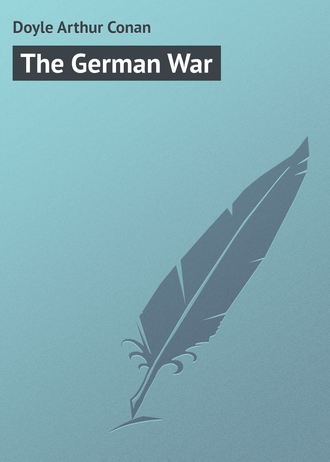
Артур Конан Дойл
The German War
VI
A POLICY OF MURDER
When one writes with a hot heart upon events which are still recent one is apt to lose one’s sense of proportion. At every step one should check oneself by the reflection as to how this may appear ten years hence, and how far events which seem shocking and abnormal may prove themselves to be a necessary accompaniment of every condition of war. But a time has now come when in cold blood, with every possible restraint, one is justified in saying that since the most barbarous campaigns of Alva in the Lowlands, or the excesses of the Thirty Years’ War, there has been no such deliberate policy of murder as has been adopted in this struggle by the German forces. This is the more terrible since these forces are not, like those of Alva, Parma, or Tilly, bands of turbulent. and mercenary soldiers, but they are the nation itself, and their deeds are condoned or even applauded by the entire national Press. It is not on the chiefs of the army that the whole guilt of this terrible crime must rest, but it is upon the whole German nation, which for generations to come must stand condemned before the civilised world for this reversion to those barbarous practices from which Christianity, civilisation, and chivalry had gradually rescued the human race. They may, and do, plead the excuse that they are “earnest” in war, but all nations are earnest in war, which is the most desperately earnest thing of which we have any knowledge. How earnest we are will be shown when the question of endurance begins to tell. But no earnestness can condone the crime of the nation which deliberately breaks those laws which have been endorsed by the common consent of humanity.
War may have a beautiful as well as a terrible side, and be full of touches of human sympathy and restraint which mitigate its unavoidable horror. Such have been the characteristics always of the secular wars between the British and the French. From the old glittering days of knighthood, with their high and gallant courtesy, through the eighteenth-century campaigns where the debonair guards of France and England exchanged salutations before their volleys, down to the last great Napoleonic struggle, the tradition of chivalry has always survived. We read how in the Peninsula the pickets of the two armies, each of them as earnest as any Germans, would exchange courtesies, how they would shout warnings to each other to fall back when an advance in force was taking place, and how, to prevent the destruction of an ancient bridge, the British promised not to use it on condition that the French would forgo its destruction – an agreement faithfully kept upon either side. Could one imagine Germans making war in such a spirit as this? Think of that old French bridge, and then think of the University of Louvain and the Cathedral of Rheims. What a gap between them – the gap that separates civilisation from the savage!
Let us take a few of the points which, when focussed together, show how the Germans have degraded warfare – a degradation which affects not only the Allies at present, but the whole future of the world, since if such examples were followed the entire human race would, each in turn, become the sufferers. Take the very first incident of the war, the mine-laying by the Königin Luise. Here was a vessel, which was obviously made ready with freshly charged mines some time before there was any question of a general European war, which was sent forth in time of peace, and which, on receipt of a wireless message, began to spawn its hellish cargo across the North Sea at points 50 miles from land in the track of all neutral merchant shipping. There was the keynote of German tactics struck at the first possible instant. So promiscuous was the effect that it was a mere chance which prevented the vessel which bore the German Ambassador from being destroyed by a German mine. From first to last some hundreds of people have lost their lives on this tract of sea, some of them harmless British trawlers, but the greater number sailors of Danish and Dutch vessels pursuing their commerce as they had every right to do. It was the first move in a consistent policy of murder.
Leaving the sea, let us turn to the air. Can any possible term save a policy of murder be applied to the use of aircraft by the Germans? It has always been a principle of warfare that unfortified towns should not be bombarded. So closely has it been followed by the British that one of our aviators, flying over Cologne in search of a Zeppelin shed, refrained from dropping a bomb in an uncertain light, even though Cologne is a fortress, lest the innocent should suffer. What is to be said, then, for the continual use of bombs by the Germans, which have usually been wasted in the destruction of cats or dogs, but which have occasionally torn to pieces some woman or child? If bombs were dropped on the forts of Paris as part of a scheme for reducing the place, then nothing could be said in objection, but how are we to describe the action of men who fly over a crowded city dropping bombs promiscuously which can have no military effect whatever, and are entirely aimed at the destruction of innocent civilians? These men have been obliging enough to drop their cards as well as their bombs on several occasions. I see no reason why these should not be used in evidence against them, or why they should not be hanged as murderers when they fall into the hands of the Allies. The policy is idiotic from a military point of view; one could conceive nothing which would stimulate and harden national resistance more surely than such petty irritations. But it is a murderous innovation in the laws of war, and unless it is sternly repressed it will establish a most sinister precedent for the future.
As to the treatment of Belgium, what has it been but murder, murder all the way? From the first days at Visé, when it was officially stated that an example of “frightfulness” was desired, until the present moment, when the terrified population has rushed from the country and thrown itself upon the charity and protection of its neighbours, there has been no break in the record. Compare the story with that of the occupation of the South of France by Wellington in 1813, when no one was injured, nothing was taken without full payment, and the villagers fraternised with the troops. What a relapse of civilisation is here! From Visé to Louvain, Louvain to Aerschott, Aerschott to Malines and Termonde, the policy of murder never fails.
It is said that more civilians than soldiers have fallen in Belgium. Peruse the horrible accounts taken by the Belgian Commission, who took evidence in the most careful and conscientious fashion. Study the accounts of that dreadful night in Louvain which can only be equalled by the Spanish Fury of Antwerp. Read the account of the wife of the burgomaster of Aerschott, with its heart-rending description of how her lame son, aged sixteen, was kicked along to his death by an aide-de-camp. It is all so vile, so brutally murderous that one can hardly realise that one is reading the incidents of a modern campaign conducted by one of the leading nations in Europe.
Do you imagine that the thing has been exaggerated? Far from it – the volume of crime has not yet been appreciated. Have not many Germans unwittingly testified to what they have seen and done? Only last week we had the journal of one of them, an officer whose service had been almost entirely in France and removed from the crime centres of Belgium. Yet were ever such entries in the diary of a civilised soldier? “Our men behaved like regular Vandals.” “We shot the whole lot” (these were villagers). “They were drawn up in three ranks. The same shot did for three at a time.” “In the evening we set fire to the village. The priest and some of the inhabitants were shot.” “The villages all round were burning.” “The villages were burned and the inhabitants shot.” “At Leppe apparently two hundred men were shot. There must have been some innocent men among them.” “In the future we shall have to hold an inquiry into their guilt instead of merely shooting them.” “The Vandals themselves could not have done more damage. The place is a disgrace to our army.” So the journal runs on with its tale of infamy. It is an infamy so shameless that even in the German record the story is perpetuated of how a French lad was murdered because he refused to answer certain questions. To such a depth of degradation has Prussia brought the standard of warfare.
And now, as the appetite for blood grows ever stronger – and nothing waxes more fast – we have stories of the treatment of prisoners. Here is a point where our attention should be most concentrated and our action most prompt. It is the just duty which we owe to our own brave soldiers. At present the instances are isolated, and we will hope that they do not represent any general condition. But the stories come from sure sources. There is the account of the brutality which culminated in the death of the gallant motor-cyclist Pearson, the son of Lord Cowdray. There is the horrible story in a responsible Dutch paper, told by an eye-witness, of the torture of three British wounded prisoners in Landen Station on October 9.
The story carries conviction by its detail. Finally, there are the disquieting remarks of German soldiers, repeated by this same witness, as to the British prisoners whom they had shot. The whole lesson of history is that when troops are allowed to start murder one can never say how or when it will stop. It may no longer be part of a deliberate, calculated policy of murder by the German Government. But it has undoubtedly been so in the past, and we cannot say when it will end. Such incidents will, I fear, make peace an impossibility in our generation, for whatever statesmen may write upon paper can never affect the deep and bitter resentment which a war so conducted must leave behind it.
Other German characteristics we can ignore. The consistent, systematic lying of the German Press, or the grotesque blasphemies of the Kaiser, can be met by us with contemptuous tolerance. After all, what is is, and neither falsehood nor bombast will alter it. But this policy of murder deeply affects not only ourselves but the whole framework of civilisation so slowly and painfully built upwards by the human race.
VII
MADNESS
We have all, I suppose, read and marvelled at the wonderful German “song of hate.” This has been so much admired over the water that Prince Ruprecht of Bavaria (who had just stated his bitter hatred of us in a prose army order) distributed copies of the verses to his Bavarians as a stimulant in their long, unsuccessful tussle with our troops at Ypres. In case the reader has forgotten its flavour, I append a typical verse:
”We will never forgo our hate.
We have all but a single hate.
We love as one, we hate as one,
We have one foe and one alone —
England.”
This sort of thing is, it must be admitted, very painful and odious. It fills us with a mixture of pity and disgust, and we feel as if, instead of a man, we were really fighting with a furious, screaming woman. Germany used to be a very great nation, mentally and morally as well as in material ways, and many of us, even while we fight her, are honestly pained by the depths of degradation into which she has fallen. This shrill scream of hate and constant frenzied ranting against Great Britain may reach its highest note in this poem, but we know that it pervades the whole Press and every class of national thought. It is deliberately fed by lying journals, which publish bogus letters describing the imaginary sufferings of German prisoners, and also by the Government itself, which upon receiving a Socialist report partly favourable to Britain, excised those passages and circulated the rest as a complete document, so as to give the idea that it was wholly condemnatory. Wherever we touch Germany in its present phase, whether it be the Overlord himself with his megalomaniac messages, the princes with their looting of châteaux, the Foreign Office with its trick of stealing American passports for the use of German spies, the army with its absolute brutality, the navy with its tactics of mine-laying in neutral waters, the Press with its grotesque concoctions, the artists with their pictures, which are so base that the decent Germans have themselves at last rebelled against them, or the business men with their assertion that there is less economic disturbance in Germany than in Great Britain – wherever, I say, you touch them you come always upon what is odious and deceitful. A long century will have passed before Germany can wash her hands clean from murder, or purge from her spirit the shadow of this evil time.
If the words of one humble individual could reach across the seas, there are two things upon which I should wish to speak earnestly to a German: the one, our own character, the other, the future which he is deliberately preparing for the Fatherland which he loves. Our papers do get over there, even as theirs come over here, so one may hope it is not impossible that some German may give a thought to what I say, if he is not so bemused by the atmosphere of lies in which his Press has enveloped him that he cannot recognise cold truth when he sees it.
First as to ourselves: we have never been a nation who fought with hatred. It is our ideal to fight in a sporting spirit. It is not that we are less in earnest, but it is that the sporting spirit itself is a thing very largely evolved by us and is a natural expression of our character. We fight as hard as we can, and we like and admire those who fight hard against us so long as they keep within the rules of the game. Let me take an obvious example. One German has done us more harm than any other in this war. He is Captain von Müller of the Emden, whose depredations represent the cost of a battleship. Yet an honest sigh of relief went up from us all when we learned that he had not perished with his ship, and if he walked down Fleet Street to-day he would be cheered by the crowd from end to end. Why? Because almost alone among Germans he has played the game as it should be played. It is true that everything that he did was illegal. He had no right to burn uncondemned prizes, and a purist could claim that he was a pirate. But we recognised the practical difficulties of his position; we felt that under the circumstances he had acted like a gentleman, and we freely forgave him any harm that he had done us. With this example before you, my German reader, you cannot say that it is national hatred when we denounce your murderers and brigands in Belgium. If they, too, had acted as gentlemen, we should have felt towards them as to von Müller.
If you look back in British history, you will find that this absence of hatred has always been characteristic of us. When Soult came to London after the Napoleonic wars, he was cheered through the City. After the Boer War, Botha, de Wet, and Delarey had a magnificent reception. We did not know that one of them was destined to prove a despicable and perjured traitor. They had been good fighters, the fight was done, we had shaken hands – and we cheered them. All British prize-fights ended with the shaking of hands. Though the men could no longer see each other, they were led up and their hands were joined. When a combatant refuses to do this, it has always been looked upon as unmanly, and we say that bad blood has been left behind. So in war we have always wished to fight to a finish and then be friends, whether we had won or lost.
Now, this is just what we should wish to do with Germany, and it is what Germany is rapidly making impossible. She has, in our opinion, fought a brave but a thoroughly foul fight. And now she uses every means to excite a bitter hatred which shall survive the war. The Briton is tolerant and easy-going in times of peace – too careless, perhaps, of the opinion of other nations. But at present he is in a most alert and receptive mood, noting and remembering very carefully every word that comes to him as to the temper of the German people and the prospects of the future. He is by no means disposed to pass over all these announcements of permanent hatred. On the contrary, he is evidently beginning, for the first time since Napoleon’s era, to show something approaching to hatred in return. He – and “he” stands for every Briton across the seas as well as for the men of the Islands – makes a practical note of it all, and it will not be forgotten, but will certainly bear very definite fruits. The national thoughts do not come forth in wild poems of hate, but they none the less are gloomy and resentful, with the deep, steady resentment of a nation which is slow to anger.
And now, my problematical German reader, I want you to realise what this is going to mean to you after the war. Whether you win or lose – and we have our own very certain opinion as to which it will be – Germany will still remain as a great independent State. She may be a little trimmed at the edges, and she may also find herself with some awkward liabilities; but none the less she will be a great kingdom or republic – as the Fates may will. She will turn her hand to trade and try to build up her fortunes once more – for even if we suppose her to be the victor, she still cannot live for ever on plunder, and must turn herself to honest trade, while if she loses her trade will be more precious to her than ever. But what will her position be when that time has come?
It will be appalling. No other word can express it. No legislation will be needed to keep German goods out of the whole British Empire, which means more than a quarter of the globe. Anything with that mark might as well have a visible cholera bacillus upon it for the chance it will have of being handled after this war. That is already certain, and it is the direct outcome of the madness which has possessed Germany in her frantic outcry of hatred. What chance they have of business with France, Russia, or Japan they know best themselves; but the British Empire, with that wide trade toleration which has long been her policy (and for which she has had so little gratitude), would have speedily forgiven Germany and opened her markets to her. Now it is not for many a long year that this can be so – not on account of the war, but on account of the bitterness which Germany has gone out of her way to import into the contest. It is idle to say that in that case we should lose our exports to Germany. Even if it were so, it would not in the least affect the sentiments of the retail sellers and buyers in this country, whose demands regulate the wholesale trade. But as a matter of fact, what Germany buys from the British Empire is the coal, wool, etc., which are the raw materials of her industry, with which she cannot possibly dispense.
But the pity of it all! We might have had a straight, honest fight, and at the end of it we might have conceded that the German people had been innocently misled, by their military caste and their Press, into the idea that their country was being attacked, and so were themselves guiltless in the matter. They, on their side, might at last have understood that Britain had been placed in such a position by her guarantees to Belgium that it was absolutely impossible that she could stand out of the war. With these mutual concessions, some sort of friendship could possibly have been restored, for it is no one’s interest, and least of all ours, that the keystone should be knocked right out of the European arch. But all this has been rendered impossible by these hysterical screamers of hate, and by those methods of murder on land, sea, and in air with which the war has been conducted. Hate is a very catching emotion, and when it translates itself into action it soon glows on either side of the North Sea. With neither race, to use Carlyle’s simile, does it blaze like the quick-flaming stubble, but with both it will smoulder like the slow red peat. Are there not even now strong, sane men in Germany who can tell these madmen what they are sowing for the next generation and the one that comes after it? It is not that we ask them to abate the resistance of their country. It is understood that this is a fight to the end. That is what we desire. But let them stand up and fight without reviling; let them give punishment without malice and receive it without wincing; let their press cease from lying, and their prophets from preaching hatred – then, lose or win, there may still be some chance for their future. But, alas! the mischief is already, I fear, too deep. When the seeds are sown, it is hard to check the harvest. Let the impartial critic consider von Müller of the Emden, and then, having surveyed our Press and that of Germany, let him say with whom lies the blame.







